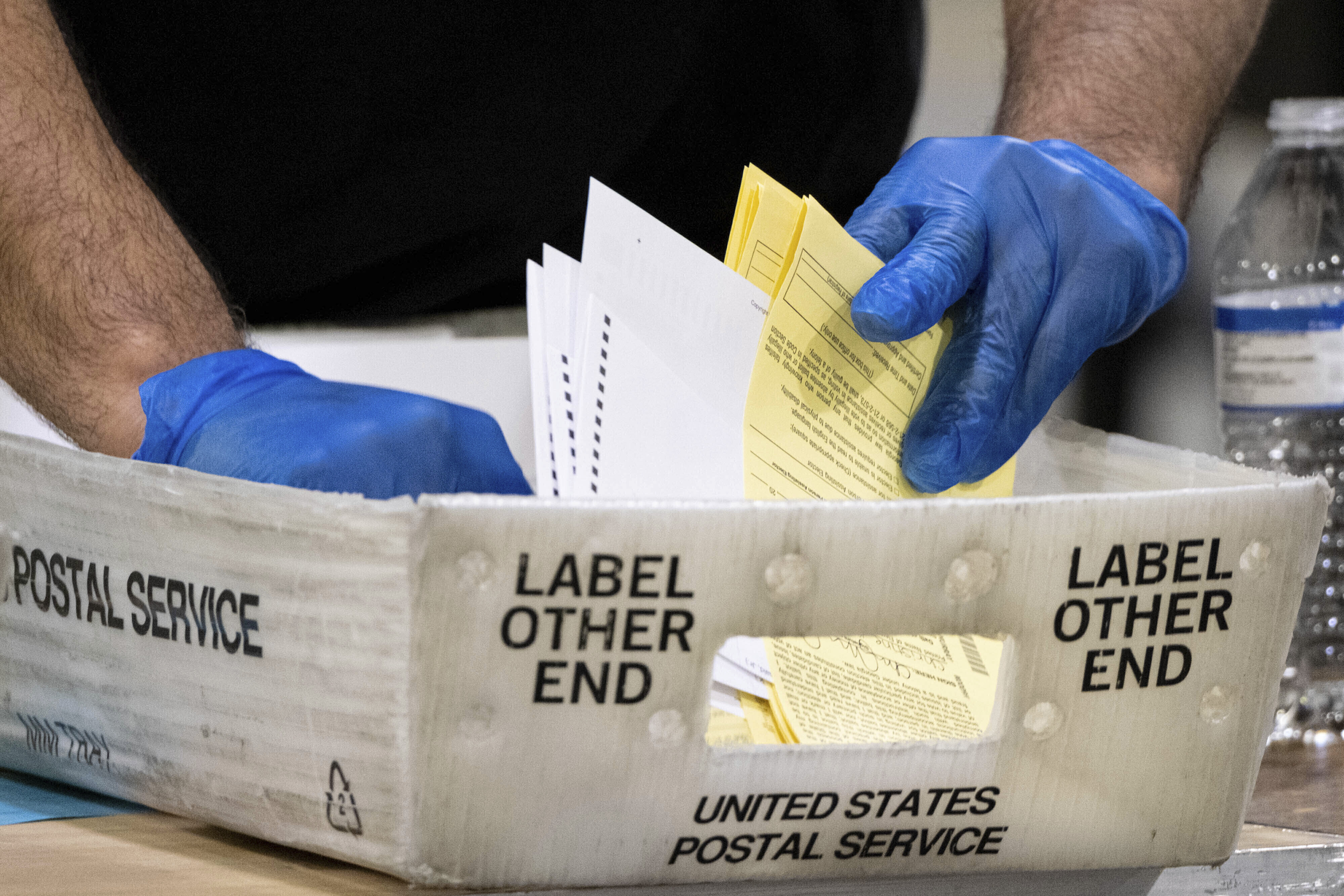Section Branding
Header Content
Battleground: Ballot Box | The year in Georgia partisan lawsuits
Primary Content
There have been a number of high-profile legal battles over legislation in Georgia recently, including laws on abortion restrictions and voting changes, and other complaints filed by Georgia political leaders over actions taken by the federal government. This week, GPB's Stephen Fowler talks lawsuits with GPB's public policy reporter Riley Bunch.
RELATED: More Georgia Secretary of State's office officials interviewed by Jan. 6 committee
Stephen Fowler: From Georgia Public Broadcasting, this is Battleground: Ballot Box. I'm Stephen Fowler. Laws govern much of how we live, how we vote, what taxes we owe, rules to keep businesses safe and detail the role of government regulations into our everyday life. It's the job of the state legislature to create and change laws and lawmakers spend several months a year at the state Capitol to do so.
House Speaker David Ralston: Have all members voted? Yes, so the clerk will lock the machines on the passage of Senate Bill 2EX. The ayes are 96, the nays are 68. This bill, having received the requisite constitutional majority, is therefore passed.
Stephen Fowler: It's up to the governor to sign or veto them.
Gov. Brian Kemp: House Bill 426, sponsored by Rep. Chuck Efstration, does not fix every problem or right every wrong, but this bipartisan legislation is a powerful step forward. It's a sign of progress and it's a milestone worth applauding.
Stephen Fowler: And when voters and organizations think those laws violate the Constitution, they sometimes head to the courts.
Sean Young, ACLU: We're asking the court to block HB 481 from going into effect before January 2020. This law is blatantly unconstitutional under 50 years of Supreme Court precedent.
Stephen Fowler: In Georgia, recently, there have been a number of high-profile legal battles over legislation, including laws on abortion restrictions and voting changes, and other complaints filed by Georgia leaders over actions by the federal government. This week, we talk lawsuits with GPB public policy reporter Riley Bunch.
Hey, Riley, why do lawsuits against sand and silt never make it to court? Because sediment always settles. OK, on a more serious note, let's talk about one of the biggest lawsuits we've seen recently that affects a ton of Georgians. It's over a federal vaccine mandate. First off, what did the federal government do that led Georgia and other states to sue?
Riley Bunch: Governors in GOP-led states, including Gov. Brian Kemp, took up arms over the requirement and are suing Biden in court. They claim it was an unconstitutional overreach of Biden's authority. They also argued it would hurt businesses who would have to choose between million-, sometimes billion-dollar federal contracts and making their employees get the shot — as Cohn called it, a quote "recipe for financial disaster."
Stephen Fowler: So tell us how Georgia's Republican Attorney General Chris Carr responded to this. I mean, he is Georgia's top law enforcement officer.
Riley Bunch: Attorney General Chris Carr argued that while Biden may have some limited authority to implement requirements for federal contractors, he does not have the power to influence state-run agencies that contract with the federal government, like the University System of Georgia or the Department of Agriculture. Carr has also led filing two other lawsuits against Biden's vaccine mandates, including his requirement for health care workers and businesses with 100 or more employees. It's all part of a nationally coordinated legal effort by Republicans to overturn Biden's vaccine requirements.
Stephen Fowler: So Georgia has a lot of health care workers and has a lot of places that contract with the federal government and certainly has a lot of businesses with 100 or more employees. What does this mean for Biden's vaccine mandate going forward from both a practical and a legal perspective?
Riley Bunch: Well, a federal court judge in Georgia actually sided with Republicans last week and decided that Biden's mandate for federal contractors was actually beyond his authority. The court also said it would be, quote, "costly, laborious and likely to result in a reduction in available members of the workforce." The judge in South Georgia issued a preliminary injunction on the requirement through Georgia's lawsuit temporarily halting implementation nationwide, which also comes at a time where concern over the new omicron variant is growing.
Stephen, there's a lot to talk about on the election front. I literally don't know how you keep track of it all. But there's a ton of suits over Georgia's new voting law, SB 202. Remind us of some of those changes to the law and what they'll do.
Stephen Fowler: So Georgia's SB 202 touches literally every part of Georgia's election administration from how the absentee ballot application process works, to how the votes are counted once the polls are closed, to different things on Election Day. Some of the biggest changes have to deal with how absentee ballot applications are processed. You now have to have a form of voter ID. That's things like a driver's license or a Social Security card or things like that. And it's relying on that information as part of a database instead of checking your signatures. And Republicans say it's to make the absentee ballot process more secure. Democrats and voting rights groups say it risks disenfranchising people. There's also changes that we've seen to drop boxes, which was something that was added on an emergency basis in the 2020 election cycle because of the coronavirus pandemic. And now this codifies that into law, but limits how some of the bigger counties are able to use them, and it limits when people can use those drop boxes. So basically, there's a lot of changes that have happened. Most of them come from a place of the 2020 election and either changes because of the coronavirus or changes because Republicans lost for the first time in a long, long time.
Riley Bunch: And there's close to 10 different lawsuits challenging the 98-page election law. What are some of the biggest complaints?
Stephen Fowler: Well, short of "everything," there are a few things that keep popping up in these lawsuits where you've got different voting rights groups that have sued — even the federal government has sued over Georgia's law, saying that it violates parts of the Constitution and disenfranchises people. I mean, there's so many different parts of this law that are being challenged in courts. One of the first lawsuits that have been filed target the new absentee ID requirements, limitations on drop boxes, a shorter runoff period, and essentially banning the use of out-of-precinct provisional votes for if you show up to the wrong polling place on Election Day. There are other ones that are more specifically targeted on parts of the thing, zeroing in on drop boxes and changes — and absentee changes; one from the African Methodist Episcopal Church points to Georgia's long history of discrimination in voting laws, from white-only primaries to poll taxes, saying this is just another in a long line of bills targeted to Black voters in. Georgia. So there's a lot of things, moving parts and pieces that are being challenged that, ultimately, a federal judge is going to have to deal with.
Riley Bunch: And where does all of this stand with the courts?
Stephen Fowler: Well, there are nine different lawsuits right now. They're all in federal court. They've all been assigned to the same judge, people. He is currently figuring out how to handle all of them because you can't just smash all the different lawsuits together and say, OK, like, we're going to hear all of this at once. But he is going to consider the discovery part, consolidating things together. And what that means, Riley, is that all of these different groups that are suing may ask the state for different documents or records or other things to kind of investigate what's going on. And so they may consolidate all the requests so the state and counties or other people that are sued have the time to search through all of those records together and just give them all out to everybody at once instead of the state and the secretary of state's office having to run nine separate inquiries into all of these documents at once. But there is some urgency because these laws are already in effect and we've got several big elections next year. But also it's the court system, so it could take a while before things to be resolved.
Riley, Georgia's abortion law is also being held up in the courts because of pending lawsuits and reviews all the way up to the U.S. Supreme Court. Quickly walk us through what that law does and where it stands.
Riley Bunch: Well, Stephen, in 2019, lawmakers in Georgia passed a law that bans abortions when a doctor can detect a so-called fetal heartbeat. This is usually around six weeks and often before women know they are pregnant. That law was quickly taken to court, and in 2020, a federal judge blocked implementation. But the state appealed his ruling. In late September, a federal appeals court indicated it would wait to rule on Georgia's law, given the fact that other lawsuits across the country would have a big impact on that case — particularly a case in Mississippi that's made its way up to the Supreme Court and has the potential to overturn Roe v. Wade. After oral arguments were heard in the case this month, the court appears poised to uphold Mississippi's law, which is similar to Georgia's creating a new legal precedent for abortion cases across the country.
Stephen Fowler: Finally, there's bound to be some litigation soon over Georgia's redistricting maps at the state and federal level as soon as Gov. Brian Kemp signs them into law. Here are some of the high points of the biggest changes. In the congressional map. Georgia's 14 districts have been redrawn, and one of them, the 6th Congressional District, goes from being Democratic leaning to Republican leaning in the northern suburbs, and the 7th Congressional District shrinks its footprint, but also makes it a heavily Democratic district. Those two are likely to be challenged. And at the state level, Republicans did draw more Democratic districts in both the House and the Senate maps. But some of the changes leave much to be desired, say some redistricting advocates and voting rights groups, and of course, Democrats, who say that the state has changed and the district should change even more to reflect how those lines are drawn. GPB's Riley Bunch, thanks so much for joining me.
Riley Bunch: Thanks, Stephen.
Stephen Fowler: Battleground: Ballot Box is a production of Georgia Public Broadcasting. Our producer is Jess Mador. Our editor is Wayne Drash. Our engineer is Jesse Nighswonger, who also wrote our theme music. You can subscribe to the show on Apple Podcasts or anywhere you get podcasts. Thanks for listening.




